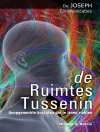‘Quantum Mythology: How Physics Shapes Our Myths and Legends’ explores the intriguing connections between quantum mechanics and ancient myths, suggesting that many legends may have been early interpretations of phenomena now understood through quantum principles, bridging the gap between science and mythology.
The driving idea behind the book ‘Quantum Mythology: How Physics Shapes Our Myths And Legends’ is to explore the intricate interplay between mythology and quantum theory. The book aims to demonstrate how ancient wisdom and modern quantum concepts are interconnected, presenting a narrative that intertwines human imagination with the realities of quantum mechanics. By examining phenomena such as wave-particle duality, entanglement, and superposition through the lens of mythology and mysticism, the book seeks to offer a profound understanding of how physics shapes our myths and legends and to reframe our perception of nature and reality.
Key Takeaways
The concept of quantum mythology integrates ancient myths with quantum mechanics to reveal fundamental truths about existence. Quantum mechanics phenomena such as superposition, entanglement, and wave-particle duality mirror themes found in global mythologies. Ancient myths often depicted cosmic creation, interconnectedness, and non-locality, which resonate with modern quantum theories. The interdisciplinary approach fosters a holistic understanding of reality, blending empirical science with symbolic mythological interpretations. The integration of quantum principles with mythology prompts a reevaluation of time, space, consciousness, and reality itself. This synthesis has practical implications for technology, such as quantum computing and communication, as well as cultural and ethical considerations. Preserving and revitalizing ancient myths through the lens of quantum mechanics can promote cultural appreciation and global unity.












